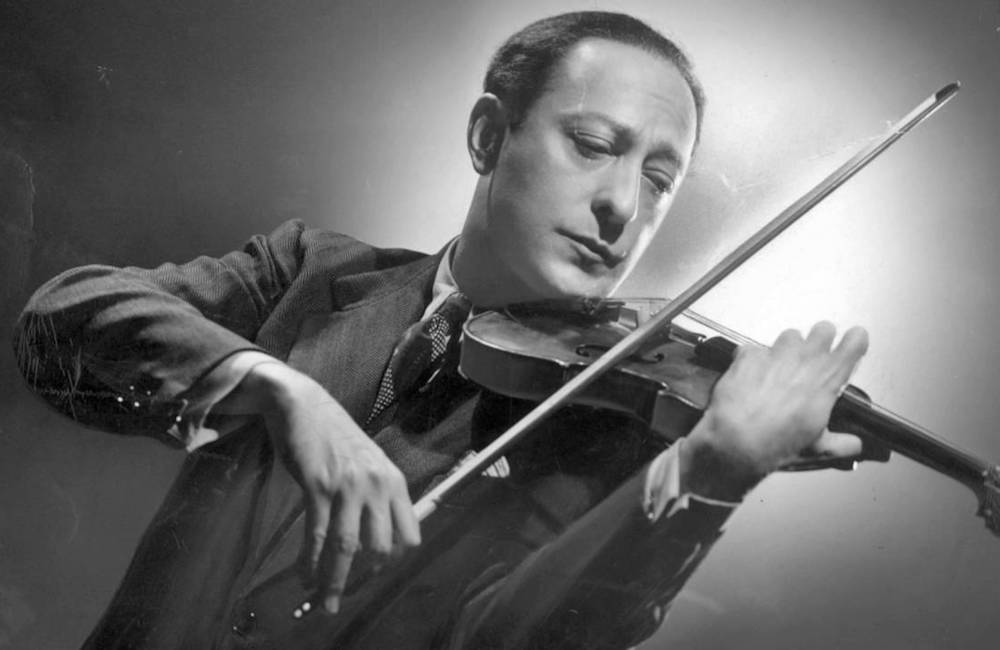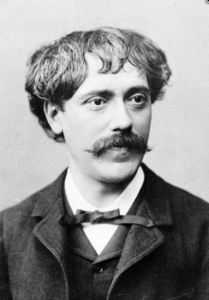
I care very much for this recording of Pablo de Sarasate’s Zigeunerweisen, played with great feeling and power by Jascha Heifetz, accompanied by the RCA Victor Symphony Orchestra and conducted by William Steinberg. Zigeunerweisen means “the ways of the gypsies.” What we just heard is rich with the opposites which, I believe, are central in this whole piece—assertion and yielding, pride and humility. These are opposites very big in my life as they are in everyone. How can we be proud without being arrogant? How can we be modest without groveling? Aesthetic Realism shows art has the answer, and we can hear it in this music.
As you heard, the orchestra begins forcefully, dramatically rising fortissimo, very loud. Then it suddenly yields as Heifetz enters, playing the same melody two octaves lower, modestly yet having dramatic flourishes of his own. That violin dances all the way up the scale to a super high Eb, then instantly drops down to a low C, followed by a joyous, proud pizzicato pluck at the end. This is assertion and yielding as one!
This opening sounds almost like a gypsy improvisation. Then we get to a clear melody. The notes are aching and sweet, passionate and inquiring. Listen to how it begins:
Pride & Humility in Art
In his great essay, Art as, Yes, Humility, Eli Siegel explains:
Humility is the willingness to see things other than oneself as having meaning for oneself. This humility makes for pride; for pride, in the long run, comes from the comprehensive and accurate way one is affected by reality, the universe that is under one’s nose and is far away. The artist is more humble than is customary, because, as artist, he wants things to mean more and more to him; he wants to see more and more.

That is what we hear—there is a desire on the part of the composer Sarasate to see what a simple melody can have in it, how much feeling. And Heifetz has this purpose, too, as he yields in a very exact way to the notes this composer wrote. Heifetz was renowned for his precision, but it isn’t a cool precision: he’s passionate, proud, and plays the music with flourish.
Good Will—the Oneness of Assertion & Yielding
This music, I believe, embodies what I learned from Aesthetic Realism is crucial for the happiness of every person: the desire to have good will—”the desire to have something else stronger and more beautiful, for this desire makes oneself stronger and more beautiful.” That desire, I learned, is both assertive and yielding: it’s an active, conscious purpose to see what something else is, to be affected. You heard this as Heifetz played the highest note of this melody. He doesn’t blast it; he yields with piercing sweetness.
This is so different from how I was in my life. My purpose was to impress people while not being too affected myself. In fact, I thought being affected by someone was a humiliation. This made for a hurtful relation in me of assertion, followed by excessive humility. I’m grateful my attitude to the world and people was criticized through my study of Aesthetic Realism, enabling me to change.
Crucial in this change is what I learned as I began to care for Bennett Cooperman, who is now my husband. When we first started living together, I was very much affected by Bennett—his care for music and drama and his friendship and kindness to many people, and his love for the knowledge of Aesthetic Realism. I felt very much that I needed him—but I also thought I’d better assert myself and let him know I was not going to take his orders. My theme song with men had been “Anything You Can Do, I Can Do Better.”
In an Aesthetic Realism class, when I spoke about this, Ellen Reiss, the Chair of Education, asked me, “Do you think you feel, ‘I’m not going to let any man walk over me’…and then there is something else in you that wants to be very sweet, but you don’t see it as strong.” And she also asked me: “Do you think you get very fast to feeling you’ve yielded sufficiently?” I did. “Yielding,” she explained, “needs to be felt as the same as expression.” Yes—and I am learning more about this with every year. Studying Aesthetic Realism melted my cold, steel-like hardness to men and the world and enabled me to be increasingly, deeply affected.
And that’s what happens in this music. Right after the yearning, melting and flourishing passages—so graceful, musically—comes the celebration! Sarasate ends Zigeurnerweisen with a wild, rapid Allegro, and from what I know, this is in keeping with the musical style of the Romani people: it is how they most often like their improvisations to go: from slowness to speed. The music in this final section kicks up its heels! Yet here, too, every note is cared for exactly and what self-expression it makes for! I think it illustrates what Mr. Siegel said in his essay, in some of the great sentences of the world: “Art, itself, is humility at one with pride. In art, the successful humility is the soul’s swellingness.”
Let’s begin with where the change occurs and listen all the way through to the brilliant, joyous conclusion!